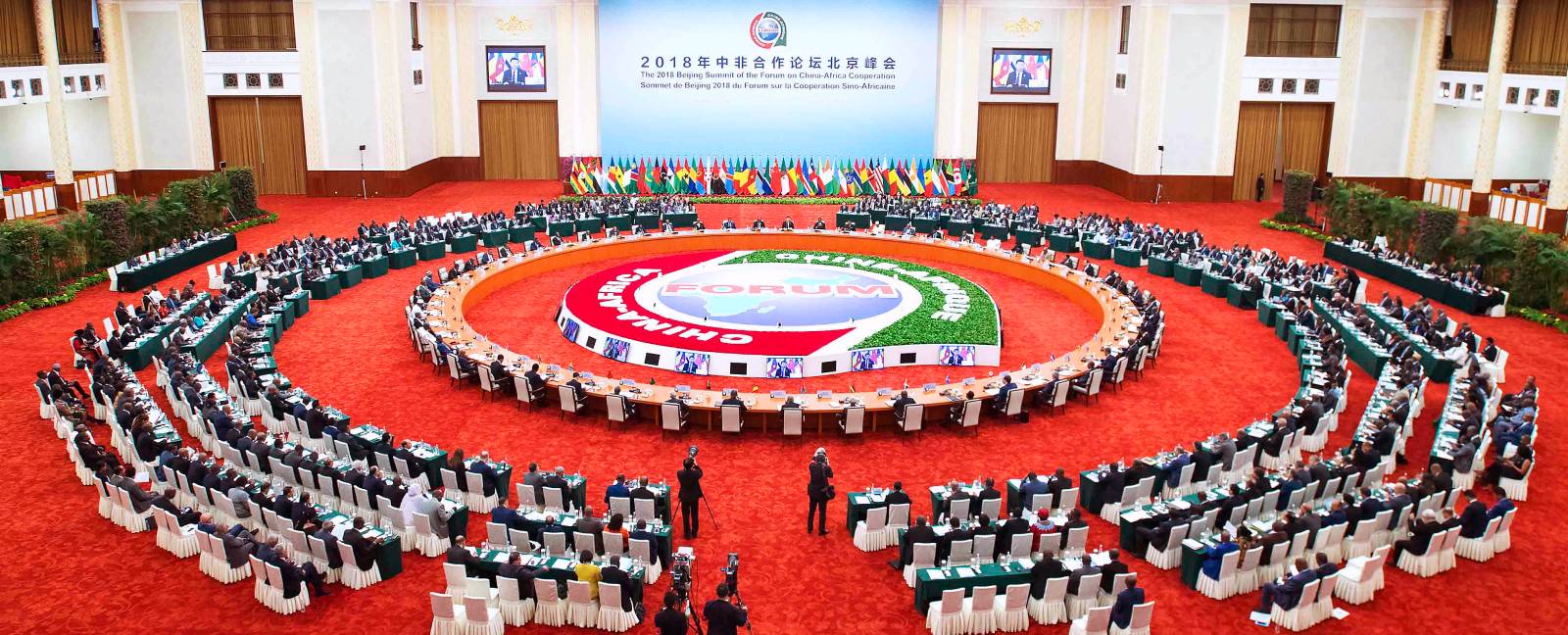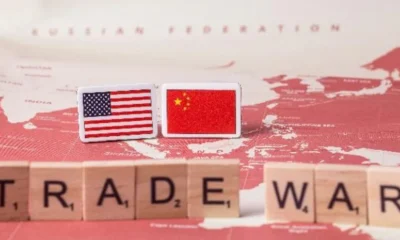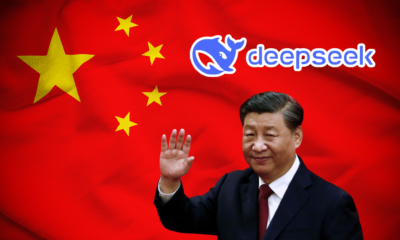Politics
China’s Expanding Foothold In Africa Is In fact A Well Waged Gamble And Not In Favour Of Africa
Published
1 year agoon

The 2024 Summit of the Forum on China-Africa Cooperation (FOCAC), held in Beijing from September 4–6, has once again shone a spotlight on the dynamics between China and Africa. Since its inception in 2000, FOCAC has become a critical platform for fostering ties between these two regions. The theme for this ninth summit, “Joining Hands to Advance Modernization and Build a High-Level China-Africa Community with a Shared Future,” emphasized ambitions for deeper collaboration.
But behind the diplomatic smiles and signed declarations lies a story of shifting dynamics, unmet expectations, and lingering questions about the future of this partnership.
China’s relationship with Africa isn’t a recent phenomenon. Way back in the 15th century, during the voyages of Admiral Zheng He, China’s Ming dynasty engaged in naval diplomacy, leaving traces of its treasure fleets on the shores of East Africa. However, both China and Africa saw their fortunes reversed with the rise of European powers, entering long periods of colonial domination.
Fast forward to the Cold War era: as Africa broke free from colonial chains, China, fresh from its own revolution, offered ideological and developmental support to nations in the so-called “Third World.” This early solidarity planted the seeds for today’s extensive economic and strategic partnerships.
Africa’s Economic Promise and China’s Growing Appetite
The post-reform Chinese economy has been a overwhelming force hungry for resources and new markets. Africa, with its wealth of untapped resources—minerals critical for green energy, hydrocarbons, fertile land, and more—became an attractive destination for Chinese investment. Simultaneously, many African nations, disillusioned by the West and the IMF-led economic policies that had defined their “lost decades,” found an eager partner in Beijing.
Yet, in recent years, cracks have begun to show in this once promising collaboration.

The FOCAC 2024 Summit and Recalibrated Expectations
Leading up to the summit, there was a palpable sense of caution. China’s financial commitments to Africa have been shrinking since 2018, and many African nations—reeling under mounting debts from past infrastructure projects—have had to tighten their fiscal belts.
For context, at the previous FOCAC summit in 2021, China pledged $40 billion, down significantly from earlier years. Debt issues in countries like Ethiopia, Kenya, and Zambia have forced both sides to reassess priorities. However, Xi Jinping surprised some observers by announcing $50 billion in financial support over the next three years. While this exceeds the 2021 pledge, it still falls short of the high-water marks seen before the pandemic.
Trade
Despite scaled-back loans, trade between China and Africa is thriving. In 2023, trade volumes reached a staggering $282 billion, representing 9.9% of Africa’s GDP. This was more than double the trade volume with India, Africa’s second-largest individual trade partner.
The demand for critical minerals needed for green technologies has been a significant driver of this boom. For instance, African countries play a pivotal role in supplying materials essential for electric vehicle batteries and renewable energy systems—industries where China leads globally.
China’s Belt and Road Initiative (BRI), long associated with mega-infrastructure projects, is undergoing a transformation. Xi’s directive to focus on “small but beautiful” projects emphasizes sustainability and cost-effectiveness. Loans such as $50 million for a solar farm in Burkina Faso emphasize this shift.
But this doesn’t mean China is stepping away from large-scale infrastructure. A $1 billion loan for a railway in Nigeria signals that the “infrastructure game” is far from over. Instead, China is diversifying its financial offerings, blending traditional loans with innovative financial mechanisms.
China’s High-Stakes Dance with Africa
The recent multi-billion-dollar loan for Guinea’s iron-ore, rail, and port development project stands out as a microcosm of the evolving relations. This deal isn’t your typical bilateral sovereign debt arrangement. Instead, it’s structured as a syndicated loan involving multiple Chinese banks—and potentially Western commercial ones—managed by a special-purpose vehicle in which the Guinean government holds a 15% stake.
While the rewards are potentially immense, offering Guinea a slice of future profits, the risks are many with the deal’s full terms undisclosed, concerns arise about whether Guinean taxpayers could be left footing the bill should the project falter.
Shifting Sands in China-Africa Partnerships
Deals like Guinea’s signal a broader shift in how China approaches African investments. No longer simply about handing out loans, China’s strategy has matured into a mix of financial instruments, partnerships, and profit-sharing models.
At this year’s Forum on China-Africa Cooperation (FOCAC) summit, African leaders aimed to secure significant commitments from Chinese firms and lenders. But in this new, murkier world of financing, the quality of investments matters just as much as the quantity.
Experts like Folashade Soulé from Oxford University emphasize the need for African leaders to unify their approach. A coordinated strategy could push China to deliver on long-standing promises—such as increased market access for African goods and greater support for local processing and refining of minerals before export. Despite a pledge in 2021 to buy $300 billion worth of African goods, China has yet to fully deliver.
Africa’s Economic Reality
The economic equation is clear- Africa needs China more than China needs Africa. Despite recent growth, Africa represents less than 5% of China’s global trade. This imbalance often weakens Africa’s bargaining position, exacerbated by internal rivalries among African nations competing for the same resources and investments.
For instance, China’s global trade with Africa in 2023 stood at $258 billion, making it Africa’s largest trading partner and the primary destination for its exports. Yet, this relationship is far from balanced. Africa exports raw materials—minerals, oil, and agricultural products—while importing finished goods, resulting in a persistent trade deficit.
Geopolitics and the Strategic Logic of China’s Africa Engagement
China’s engagement with Africa isn’t just about economics; it’s deeply rooted in geopolitical strategy. Africa, home to 54 nations that make up a quarter of the UN’s membership, is a crucial vote bank in global governance. Elevating Africa’s development status bolsters China’s leadership claims over the Global South, aligning with its aspirations for global influence.
Africa’s significance goes beyond its UN votes. Geopolitical theorists like Halford Mackinder have long identified Sub-Saharan Africa as a “heartland” critical to global dominance. Historically, Africa has been a contested space—from the colonial-era “scramble for Africa” to its Cold War status as a battleground for superpower influence.
Today, China’s ambitions to control this heartland mirror its broader global aspirations. By investing in Africa, Beijing not only secures vital resources but also positions itself as a dominant force in the region, potentially turning Africa into a new geopolitical shatterbelt.
The Risks of a New “Shatterbelt”
The term “shatterbelt,” introduced by political geographer Saul Bernard Cohen, describes a politically fragmented zone destabilized by major power competition. Africa, after two decades of relative stability and growth, risks returning to this status as China ramps up its influence.
Beijing’s expanding footprint has sparked unease. While investments like Guinea’s iron-ore project offer opportunities, they also raise concerns about debt sustainability, transparency, and the broader implications of foreign dominance.
China has no doubt become a dominant player in Africa, leveraging its economic, diplomatic, and security instruments to fill the void left by the Soviet Union’s retreat. Over the last two decades, this engagement has significantly shaped China-Africa relations, evolving into a multifaceted partnership characterized by trade, investments, loans, security collaboration, and diplomacy.
To put the numbers into perspective –
–China has invested around $143 billion in Africa and extended $170 billion in loans over two decades.
–The major recipients of investments are Nigeria, Angola, Ethiopia, South Africa, and Algeria.
Infrastructure Financing
–China is the largest lender in Africa’s infrastructure sector, surpassing Western donors in this domain.
–Loans, primarily issued by the Export-Import Bank of China and the China Development Bank, are provided at near-market rates rather than concessional terms.
–Angola remains the largest debtor, followed by Ethiopia, Kenya, Zambia, and Nigeria.
Debt Dynamics
–Approximately 12% of Africa’s external debt is owed to China.
While Chinese lending peaked in 2016 and has since slowed, Beijing has yet to announce significant debt relief measures for Africa.
Peacekeeping and Arms Sales
–China became the second-largest contributor of peacekeeping forces to Africa in 2019 and is also the second-largest arms supplier, catering to countries like Nigeria, Ethiopia, and Angola.
Military Bases and Training
–In 2015, China established its first overseas military base in Djibouti, marking a significant shift in its security strategy. Speculations suggest a similar base may be planned in Equatorial Guinea.
–China has also set up a military training school in Tanzania and provides training to African military and police forces.
Private Security
–In response to threats to Chinese investments and personnel, private security contractors have been deployed in parts of Africa.
Diplomatic Engagement, Bilateral and Multilateral Diplomacy
–China maintains consistent engagement through annual visits by its Foreign Minister to African countries—a tradition for over 30 years.
Strategic partnerships include agreements with the African Union (AU) and synchronization of AU’s Agenda 2063 with China’s Belt and Road Initiative (BRI).
Guiding Vision and Initiatives
–The 2021 Forum on China-Africa Cooperation (FOCAC) summit adopted the “China-Africa Cooperation Vision 2035” to shape future relations.
–Initiatives like the Global Development Initiative, Global Security Initiative, and Global Civilization Initiative emphasize shared growth and stability.
Non-Interference Principle
–The Beijing Declaration reinforces China’s commitment to respecting African countries’ sovereignty, avoiding interference in internal affairs, and attaching no political strings to its assistance.

The Broader Context
Under Xi Jinping’s leadership, China’s diplomacy has shifted towards creating a “community with a shared future for mankind,” with Africa being central to this narrative. Through its strategic investments, security collaborations, and diplomatic overtures, China aims to solidify its position as a key partner for Africa while advancing its global ambitions.
China has strategically positioned itself as a partner of Africa by emphasizing their shared colonial past, contrasting sharply with the approach of Western powers. Unlike former colonial powers, which often maintain ties rooted in their colonial legacy, China has based its relationship with Africa on revolutionary resistance against colonialism and imperialism.
This narrative was underscored at the 37th African Union summit in 2024, where China supported the “Proclamation on Building a United Front to Promote the Cause of Justice and Payment of Reparations to Africans.” This approach has allowed China to attack the West’s influence in Africa while portraying itself as a champion of justice for the continent.
China’s support extends to countries under Western sanctions, such as Eritrea, Sudan, South Sudan, and Zimbabwe, while also positioning itself as a mediator in African conflicts. President Xi Jinping has called for stronger ties between China and African nations, emphasizing modernization that respects “national realities” rather than blindly adhering to general global norms. Proposals like the “10 partnership actions” encompass areas such as trade, green development, health, and security, aiming to deepen bilateral ties.
In a landmark move, Xi pledged $50 billion over three years to Africa, including $30 billion in credit, $10 billion in aid, and $10 billion in investments. Notably, he announced a “zero-tariff treatment” for all 33 Least Developed Countries in Africa, the first such initiative by any large economy. This commitment also included creating one million jobs across the continent. While these initiatives highlight China’s significant role in Africa’s development, they also reflect a shift toward addressing criticisms, such as prior practices of importing Chinese labor instead of employing locals.
Geopolitical Implications and Challenges
Despite China’s growing influence, it faces mixed perceptions in Africa. While it lags behind the United States in favorability, it is viewed more positively than former colonial powers, particularly in regions like the Sahel. The development deficits and discontent with Western partners like France have driven some nations, such as Mali, Burkina Faso, and Niger, to seek alternative alliances, including Russia and China. Additionally, China has bolstered its standing by opposing Israel’s actions in Gaza, resonating with Africa’s historical affinity for Palestine.
However, concerns about overdependence on China persist. Critics argue that Chinese investments prioritize resource extraction and the transportation of Africa’s wealth rather than fostering industrial growth. Protectionist measures against Chinese exports in the West also risk diverting surplus capacity to Africa, potentially treating the continent as a dumping ground for cheap goods. Environmental degradation linked to Chinese projects further exacerbates this perception, despite China’s efforts to expand green investments.
Economic and Political Concerns
China’s presence in Africa has sparked debates about sovereignty, debt, and governance. High debt levels owed to China, coupled with recent financial defaults in Zambia and Sri Lanka, raise fears of economic vulnerability. Issues of corruption, human rights violations, and opaque dealings have also emerged, with China often accused of supporting authoritarian regimes under its non-interventionist policy. This has made China a contentious topic in political campaigns in countries like Zambia and Ghana, with instances of local unrest and attacks on Chinese personnel in nations like Kenya and the Democratic Republic of the Congo.
The Contest Between India and China
Africa has become a key battleground for influence among major powers, with both India and China vying to strengthen their footholds on the continent. While China’s growing presence in Africa is often described as “destabilising” by traditional powers like the US, India’s engagement reflects an attempt to balance China’s influence while building on its historical and cultural ties.
India’s connection to Africa predates its modern rivalries, rooted in centuries of trade and cultural exchanges across the Indian Ocean. Like China, India emphasizes its shared colonial past with Africa and its status as a developing nation to foster fraternal ties. However, India’s presence in Africa, whether in trade, investments, or aid, still lags behind China’s extensive reach. China’s omni-directional strategy spans the entire continent, while India’s diplomatic and economic efforts remain primarily concentrated in eastern and southern Africa due to geographical proximity, historical connections, and colonial ties.
Despite the gap, India has been steadily intensifying its outreach. The country has expanded its diplomatic missions, enhanced economic cooperation, and strengthened security partnerships with African nations. India’s multilateral initiatives, such as the International Solar Alliance, the Global Biofuel Alliance, and the Coalition for Disaster Resilient Infrastructure, have sought to include African nations in addressing global challenges like energy and climate change. India’s sharing of Digital Public Infrastructure technologies also highlights its focus on long-term development partnerships.
One of India’s most significant diplomatic achievements was championing the African Union’s inclusion as a permanent member of the G20 during its 2023 presidency. This move showed India’s commitment to Africa’s global representation, a sentiment echoed in China’s 2024 Beijing Declaration, which acknowledged Africa’s appreciation for China’s support in this endeavor.
Countering the “China Alternative”
India’s presence in Africa can serve as a stabilizing factor amidst growing geopolitical rivalries. By presenting itself as a viable alternative to China, India has the opportunity to prevent Africa from becoming a shatterbelt region—divided and exploited by external powers in proxy wars. To achieve this, India must sustain its momentum in building goodwill, fostering inclusive partnerships, and ensuring Africa’s integration into global frameworks like the Indo-Pacific, which offer avenues for mutual growth and stability.
The Final Words
The China-Africa relationship is anything but straightforward. It is a story of economic interdependence, geopolitical strategy, and the challenges of navigating a rapidly shifting global order.
Will Africa emerge as a true partner in this equation, or will it become a battleground for competing interests? The answer lies in how the continent balances its needs, negotiates its deals, and asserts its place in the world.

You may like
-


Taiwan’s ‘Historic’ TSMC Deal, A Win Or The End Of Its ‘Silicon Shield’ As China Threatens? A Jittery Taiwan Watches Trump’s Moves On Ukraine, Wondering, Could We Be Next?
-


A Trade War That Just Won’t Quit. As Trump’s Tariffs Hit, China Stays The Course, For Xi’s Its Business As Usual Strategy
-


Indian Stock Market In Turmoil. Investors In Panic Mode, Is This A Temporary Correction Or The Start Of A Bear Market?
-


America And China’s Thirst For Gold In 2025 Is Draining Other Countries’ Reserves; Here’s Why?
-


Shakeup In The Auto Sector. Mercedes-Benz 15% Job Cuts, Nissan CEO Exit, And Germany’s Make-Or-Break Year
-


DeepSeek Ai Rush. China’s AI Contender Gears Up for Next Big Launch Even As It Gets Xi Jinping’s Blessings
